12 start with L start with L
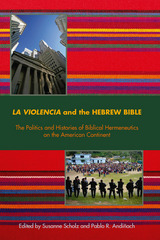
Exegetically noteworthy and culturally-theologically relevant
Violence in its wide range of horrifying expressions is real in people’s lives, and biblical interpreters must take violence in the world seriously to arrive at relevant ideas about the place of the Bible in the world. Each essay addresses people’s experiences of violence in the study of the Bible through the context of la violencia, the Spanish noun referring to the brutal, repressive, and murderous policies of state-sponsored violence practiced in many South and Central American and Caribbean countries during the twentieth century that external powers such as the USA often endorsed and fostered. The volume represents an important contribution to biblical studies and to the field of Latina/o studies. The contributors are Cheryl B. Anderson, Pablo Andiñach, Nancy Bedford, Lee Cuéllar, Steed V. Davidson, Serge Frolov, Renata Furst, Julia M. O’Brien, Todd Penner, José Enrique Ramírez, Ivoni Richter Reimer, and Susanne Scholz.
Features:
- Twelve essays by scholars living and working on the American continent
- Articles reveal the complex historical, political, and cultural conditions on the American continent that have contributed to our understanding of violence in the Bible
- Focus on themes of racial, social, and cultural violence
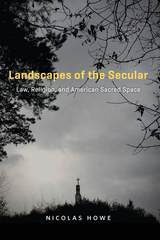
Fusing geography, legal scholarship, and religion in a potent analysis, Howe shows how seemingly routine questions about how to look at a sunrise or a plateau or how to assess what a mountain is both physically and ideologically, lead to complex arguments about the nature of religious experience and its implications for our lives as citizens. In American society—nominally secular but committed to permitting a diversity of religious beliefs and expressions—such questions become all the more fraught and can lead to difficult, often unsatisfying compromises regarding how to interpret and inhabit our public lands and spaces. A serious commitment to secularism, Howe shows, forces us to confront the profound challenges of true religious diversity in ways that often will have their ultimate expression in our built environment. This provocative exploration of some of the fundamental aspects of American life will help us see the land, law, and society anew.
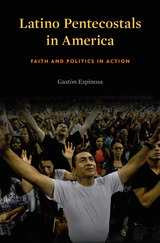
Every year an estimated 600,000 U.S. Latinos convert from Catholicism to Protestantism. Today, 12.5 million Latinos self-identify as Protestant—a population larger than all U.S. Jews and Muslims combined. Spearheading this spiritual transformation is the Pentecostal movement and Assemblies of God, which is the destination for one out of four converts. In a deeply researched social and cultural history, Gastón Espinosa uncovers the roots of this remarkable turn and the Latino AG’s growing leadership nationwide.
Latino Pentecostals in America traces the Latino AG back to the Azusa Street Revivals in Los Angeles and Apostolic Faith Revivals in Houston from 1906 to 1909. Espinosa describes the uphill struggles for indigenous leadership, racial equality, women in the ministry, social and political activism, and immigration reform. His analysis of their independent political views and voting patterns from 1996 to 2012 challenges the stereotypes that they are all apolitical, right-wing, or politically marginal. Their outspoken commitment to an active faith has led a new generation of leaders to blend righteousness and justice, by which they mean the reconciling message of Billy Graham and the social transformation of Martin Luther King, Jr. Latino AG leaders and their 2,400 churches across the nation represent a new and growing force in denominational, Evangelical, and presidential politics.
This eye-opening study explains why this group of working-class Latinos once called “The Silent Pentecostals” is silent no more. By giving voice to their untold story, Espinosa enriches our understanding of the diversity of Latino religion, Evangelicalism, and American culture.
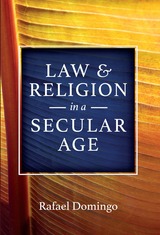
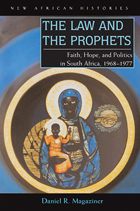
“No nation can win a battle without faith,” Steve Biko wrote, and as Daniel R. Magaziner demonstrates in The Law and the Prophets, the combination of ideological and theological exploration proved a potent force.
The 1970s are a decade virtually lost to South African historiography. This span of years bridged the banning and exile of the country’s best-known antiapartheid leaders in the early 1960s and the furious protests that erupted after the Soweto uprisings of June 16, 1976. Scholars thus know that something happened—yet they have only recently begun to explore how and why.
The Law and the Prophets is an intellectual history of the resistance movement between 1968 and 1977; it follows the formation, early trials, and ultimate dissolution of the Black Consciousness movement. It differs from previous antiapartheid historiography, however, in that it focuses more on ideas than on people and organizations. Its singular contribution is an exploration of the theological turn that South African politics took during this time. Magaziner argues that only by understanding how ideas about race, faith, and selfhood developed and were transformed in this period might we begin to understand the dramatic changes that took place.
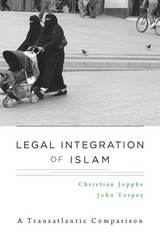
The status of Islam in Western societies remains deeply contentious. Countering strident claims on both the right and left, Legal Integration of Islam offers an empirically informed analysis of how four liberal democracies—France, Germany, Canada, and the United States—have responded to the challenge of integrating Islam and Muslim populations. Demonstrating the centrality of the legal system to this process, Christian Joppke and John Torpey reject the widely held notion that Europe is incapable of accommodating Islam and argue that institutional barriers to Muslim integration are no greater on one side of the Atlantic than the other.
While Muslims have achieved a substantial degree of equality working through the courts, political dynamics increasingly push back against these gains, particularly in Europe. From a classical liberal viewpoint, religion can either be driven out of public space, as in France, or included without sectarian preference, as in Germany. But both policies come at a price—religious liberty in France and full equality in Germany. Often seen as the flagship of multiculturalism, Canada has found itself responding to nativist and liberal pressures as Muslims become more assertive. And although there have been outbursts of anti-Islamic sentiment in the United States, the legal and political recognition of Islam is well established and largely uncontested.
Legal Integration of Islam brings to light the successes and the shortcomings of integrating Islam through law without denying the challenges that this religion presents for liberal societies.

Letters from the Lockdown presents the twelve original letters alongside new, deeply personal accounts from public servants on the job. Together, this collection provides an opportunity to reflect on how public values meet practice as the global crisis unfolds.
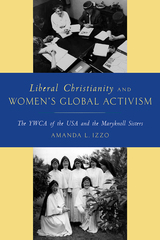
Focusing on the histories of two highly influential groups, the Young Women’s Christian Association of the USA, an interdenominational Protestant organization, and the Maryknoll Sisters, a Roman Catholic religious order, Izzo offers new perspectives on the contributions of these women to transnational social movements, women’s history, and religious studies, as she traces the connections between turn-of-the-century Christian women’s reform culture and liberal and left-wing religious social movements of the 1960s and 1970s. Izzo suggests that shared ethical, theological, and institutional underpinnings can transcend denominational divides, and that strategies for social change often associated with secular feminism have ties to spiritually inspired social movements.
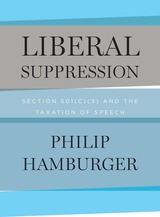
Tracing the history of American liberalism, including theological liberalism and its expression in nativism, Hamburger shows the centrality of turbulent popular anxieties about the Catholic Church and other potentially orthodox institutions. He argues persuasively that such theopolitical fears about the political speech of churches and related organizations underlay the adoption, in 1934 and 1954, of section 501(c)(3)’s speech limits. He thereby shows that the speech restrictions have been part of a broad majority assault on minority rights and that they are grossly unconstitutional.
Along the way, Hamburger explores the role of the Ku Klux Klan and other nativist organizations, the development of American theology, and the cultural foundations of liberal “democratic” political theory. He also traces important legal developments such as the specialization of speech rights and the use of law to homogenize beliefs. Ultimately, he examines a wide range of contemporary speech restrictions and the growing shallowness of public life in America.
His account is an unflinching look at the complex history of American liberalism and at the implications for speech, the diversity of belief, and the nation’s future.
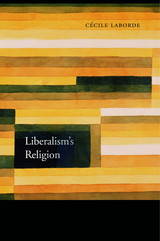
Liberal societies conventionally treat religion as unique under the law, requiring both special protection (as in guarantees of free worship) and special containment (to keep religion and the state separate). But recently this idea that religion requires a legal exception has come under fire from those who argue that religion is no different from any other conception of the good, and the state should treat all such conceptions according to principles of neutrality and equal liberty. Cécile Laborde agrees with much of this liberal egalitarian critique, but she argues that a simple analogy between the good and religion misrepresents the complex relationships among religion, law, and the state. Religion serves as more than a statement of belief about what is true, or a code of moral and ethical conduct. It also refers to comprehensive ways of life, political theories of justice, modes of voluntary association, and vulnerable collective identities.
Disaggregating religion into its various dimensions, as Laborde does, has two clear advantages. First, it shows greater respect for ethical and social pluralism by ensuring that whatever treatment religion receives from the law, it receives because of features that it shares with nonreligious beliefs, conceptions, and identities. Second, it dispenses with the Western, Christian-inflected conception of religion that liberal political theory relies on, especially in dealing with the issue of separation between religion and state. As a result, Liberalism’s Religion offers a novel answer to the question: Can Western theories of secularism and religion be applied more universally in non-Western societies?
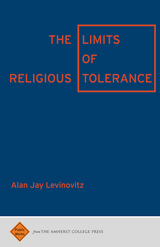
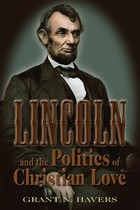
In this provocative book, Grant Havers argues that charity is a central tenet of what Lincoln once called America’s “political religion.” He explores the implications of making Christian love the highest moral standard for American democracy, showing how Lincoln’s legacy demands that a true democracy be charitable toward all—and that only a people who lived according to such ideals could succeed in building democracy as Lincoln understood it.
Havers argues that it is simplistic to conflate Lincoln’s invocation of “with charity for all” with his abiding support for the ideal of human equality. The ethic of charity in his view also brought a uniquely Christian realism to the universalism of democracy. He also describes how, since World War I, intellectuals and political leaders have denied that there exists a necessary relation between democracy and Christian love, proposing that democracy is sufficiently ethical without reliance on a specific religious tradition. Today’s neoconservatives and liberals instead posit a universal yearning for democracy that requires no foundation in the ethic of charity. Havers shows that this democratic universalism, espoused by those who believe a “chosen people” should uphold the natural rights of humanity, is alien to the sober thought of both the founders and Lincoln.
This carefully argued work defends Lincoln’s understanding of charity as essential to democracy while emphasizing the difficulty of fusing this ethic with the desire to spread democracy to people who do not share America’s Christian heritage. In considering the prospect of America’s leaders rediscovering a moral foreign policy based on charity rather than the costly idolization of democracy, Lincoln and the Politics of Christian Love makes a timely contribution to the wider debate over both the meaning of religion in American politics and the mission of America in the world—and opens a new window on Lincoln’s lasting legacy.
READERS
Browse our collection.
PUBLISHERS
See BiblioVault's publisher services.
STUDENT SERVICES
Files for college accessibility offices.
UChicago Accessibility Resources
home | accessibility | search | about | contact us
BiblioVault ® 2001 - 2024
The University of Chicago Press









